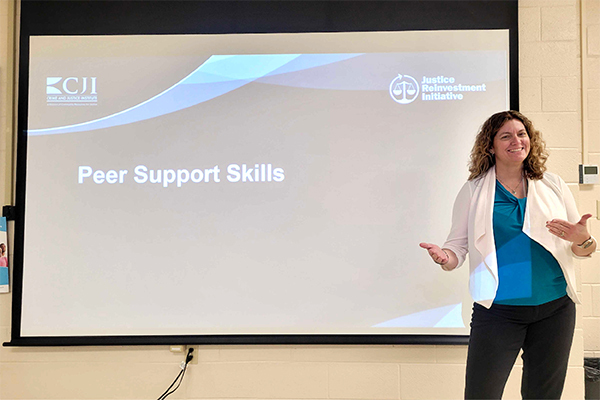
In coordination with the Crime and Justice Institute (CJI), the Tennessee Corrections Institute (TCI) is implementing a new peer support program to improve wellness among the state’s jail staff. Corrections staff face constant pressures on the job that may take significant tolls on their mental and physical health. The program will pioneer strategies to help jail staff increase job satisfaction, reduce stress at work and home, and minimize employee turnover.
What is a peer support program?
Police departments across the United States began implementing peer support programs in the 1970s to help address alcoholism among officers. In the decades since, law enforcement peer support programs broadened in scope and purpose, promoting a range of positive changes in the daily lives of staff.
Recognizing the many pressures corrections staff face, TCI and CJI are adopting this model and tailoring it to respond to the needs and responsibilities of jail employees. Jail employees, who understand best the unique challenges their colleagues face, are enrolled in training as Peer Support Officers (PSOs) to guide peers to practices and resources that boost their professional and personal wellness. PSOs are available to listen to and assist their peers to address a range of day-to-day and big-picture issues, including overtime and fatigue caused by staffing shortages, exposure to traumatic events such as attempted suicides and drug overdoses among the detained population in addition to issues at home, such as marital, childcare and financial pressures. As part of the rollout of PSOs, TCI is working to decrease the stigma associated with behavioral health issues and seeking assistance.
How does the peer support program work?
Through the peer support program, TCI aims to provide the opportunity for staff to connect with someone who understands their role and experiences. PSOs are specially trained to support their peers during times of personal or professional distress and to be a “sounding board” for those reticent about seeking help.
Participants in the peer support program learn:
- The history of and need for peer support programs
- Structural components needed to create a peer support program within an agency
- Skills needed to effectively provide support
- When and how to direct peers to internal or community resources for additional support
Funded by the Department of Justice Office of Justice Programs Bureau of Justice Assistance, CJI is delivering two-day trainings in three different locations across the state. Modules include interactive skill building and practice activities to ensure participants are prepared to fulfill the responsibilities of a peer supporter. Following the initial training, staff may opt-in to a train-the-trainer session, which will allow them to teach others and ensure that the program can continue after CJI has completed its initial trainings.
Positive feedback
Responses to CJI’s trainings have been overwhelmingly positive. Among post-training evaluation respondents, all trainees found the program relevant to their work, and all said the training increased their knowledge and that they were satisfied with the training and topics.
Testimonials have been equally encouraging. In post-training feedback, one participant wrote that the training opened their eyes to the importance of listening and not just jumping to problem solving. Another participant predicts that the program will profoundly impact how corrections officers relate to coworkers and with the people incarcerated in their jails.
Future efforts
Applying the peer support model to a corrections context for availability statewide is novel and presents an opportunity to learn. If the program is effective, it may serve as a model for other jurisdictions hoping to better support their corrections staff.
“Bringing the peer support model to jails is an innovative and exciting opportunity,” said Barbara Pierce, CJI Director of Initiatives. “We’re thrilled for the possibilities this program brings to Tennessee and the implications it could have for jails and prisons across the country.”